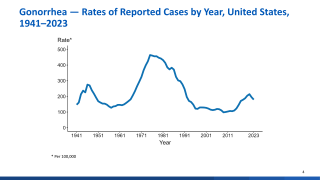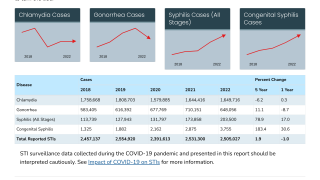Sexually Transmitted Infections Continue Increasing in Europe

The European Centre for Disease Prevention and Control (ECDC) recently released its latest Annual Epidemiological Reports on sexually transmitted infections (STIs), revealing continued increases across Europe.
The findings highlight the urgent need for increased public awareness, prevention, testing, and treatment efforts to address this growing public health concern.
For example, in 2023, nearly 100,000 confirmed cases of gonorrhea were reported in EU/EEA countries, showing a 31% increase compared to 2022 and a striking increase of more than 300% compared to 2014.
The highest rates among women were within the age group 20 to 24, which is also the group with the steepest increase in 2023 (46%).
The ECDC says if left untreated, gonorrhea can lead to significant health problems, such as pelvic inflammatory disease and infertility in both men and women. It emphasizes the importance of proactive measures to address the rising STI rates.
From a prevention perspective, new and repurposed vaccines will be evaluated in 2025.
GSK's investigational vaccine (NgG) for Neisseria gonorrhoeae received the U.S. Food and Drug Administration Fast Track designation in 2023.
Various studies have also reported the effectiveness of a serogroup B outer membrane vesicle meningococcal vaccine in preventing gonorrhea infections. On July 8, 2024, the Journal of Infection published results from a systematic review and meta-analysis that found Outer Membrane Vesicles vaccine effectiveness against gonorrhea ranged from 22% to 46%.
On February 10, 2025, the ECDC wrote, 'Early detection and treatment are essential to prevent further transmission and potential complications. If you suspect you may have contracted an STI, seek medical advice immediately.'
Our Trust Standards: Medical Advisory Committee















